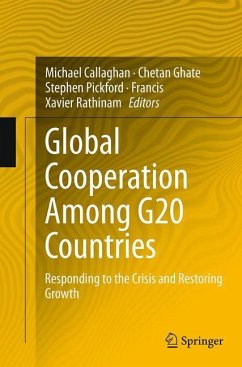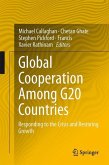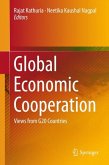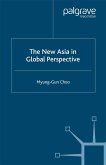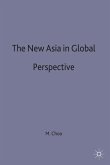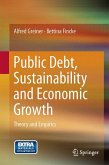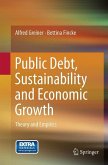Global Cooperation Among G20 Countries
Responding to the Crisis and Restoring Growth
Herausgegeben:Callaghan, Michael; Ghate, Chetan; Pickford, Stephen; Rathinam, Francis Xavier
Global Cooperation Among G20 Countries
Responding to the Crisis and Restoring Growth
Herausgegeben:Callaghan, Michael; Ghate, Chetan; Pickford, Stephen; Rathinam, Francis Xavier
- Broschiertes Buch
- Merkliste
- Auf die Merkliste
- Bewerten Bewerten
- Teilen
- Produkt teilen
- Produkterinnerung
- Produkterinnerung
At the outbreak of the global financial crisis, 2008, the G20 was widely acknowledged as helping prevent an even more serious decline in the global economy. It helped to calm the panic in financial markets and articulate a set of possible policy options to restore global stability and growth. However, as the dual-track recovery set in, policy options for advanced economies and EMEs diverged. Within this context, this book will explore the scope for cooperation amongst the G20 and the diverging challenges and the intricate interconnectedness of policy options between advanced economies and the EMEs within the G20.…mehr
Andere Kunden interessierten sich auch für
![Global Cooperation Among G20 Countries Global Cooperation Among G20 Countries]() Global Cooperation Among G20 Countries77,99 €
Global Cooperation Among G20 Countries77,99 €![Global Economic Cooperation Global Economic Cooperation]() Global Economic Cooperation77,99 €
Global Economic Cooperation77,99 €![The New Asia in Global Perspective The New Asia in Global Perspective]() M. ChooThe New Asia in Global Perspective122,99 €
M. ChooThe New Asia in Global Perspective122,99 €![The New Asia in Global Perspective The New Asia in Global Perspective]() M. ChooThe New Asia in Global Perspective116,99 €
M. ChooThe New Asia in Global Perspective116,99 €![The New Asia in Global Perspective The New Asia in Global Perspective]() M. ChooThe New Asia in Global Perspective116,99 €
M. ChooThe New Asia in Global Perspective116,99 €![Public Debt, Sustainability and Economic Growth Public Debt, Sustainability and Economic Growth]() Alfred GreinerPublic Debt, Sustainability and Economic Growth85,99 €
Alfred GreinerPublic Debt, Sustainability and Economic Growth85,99 €![Public Debt, Sustainability and Economic Growth Public Debt, Sustainability and Economic Growth]() Alfred GreinerPublic Debt, Sustainability and Economic Growth77,99 €
Alfred GreinerPublic Debt, Sustainability and Economic Growth77,99 €-
-
-
At the outbreak of the global financial crisis, 2008, the G20 was widely acknowledged as helping prevent an even more serious decline in the global economy. It helped to calm the panic in financial markets and articulate a set of possible policy options to restore global stability and growth. However, as the dual-track recovery set in, policy options for advanced economies and EMEs diverged. Within this context, this book will explore the scope for cooperation amongst the G20 and the diverging challenges and the intricate interconnectedness of policy options between advanced economies and the EMEs within the G20.
Produktdetails
- Produktdetails
- Verlag: Springer / Springer India / Springer, Berlin
- Artikelnr. des Verlages: 978-81-322-2910-0
- Softcover reprint of the original 1st ed. 2014
- Seitenzahl: 316
- Erscheinungstermin: 27. August 2016
- Englisch
- Abmessung: 235mm x 155mm x 18mm
- Gewicht: 482g
- ISBN-13: 9788132229100
- ISBN-10: 813222910X
- Artikelnr.: 45610991
- Herstellerkennzeichnung Die Herstellerinformationen sind derzeit nicht verfügbar.
- Verlag: Springer / Springer India / Springer, Berlin
- Artikelnr. des Verlages: 978-81-322-2910-0
- Softcover reprint of the original 1st ed. 2014
- Seitenzahl: 316
- Erscheinungstermin: 27. August 2016
- Englisch
- Abmessung: 235mm x 155mm x 18mm
- Gewicht: 482g
- ISBN-13: 9788132229100
- ISBN-10: 813222910X
- Artikelnr.: 45610991
- Herstellerkennzeichnung Die Herstellerinformationen sind derzeit nicht verfügbar.
Mike Callaghan is Director of the G20 Studies Centre at the Lowy Institute for International Policy. Mike has extensive experience in international economic issues, both in the Australian Treasury and the International Monetary Fund (IMF). From 2008 until 2012 he was Executive Director (International) in the Treasury and was Australia's G20 Finance Deputy. Mike also served as the Prime Minister's Special Envoy, International Economy. From 2005 until 2007 he was Executive Director, Revenue Group in the Treasury. Prior to this position he spent four years at the IMF in Washington DC as an Executive Director. Between 1999 and 2000, Mike served as Chief of Staff to the Australian Treasurer, the Hon. Peter Costello. Mike has held various senior positions in the Australian Treasury. In 2009 he was awarded the Public Service Medal and in 2013 was made a Member of the Order of Australia. Chetan Ghate is an Associate Professor in the Economics and Planning Unit of the Indian Statistical Institute - Delhi. He is currently a member of the Technical Advisory Committee for Monetary Policy at the Reserve Bank of India. He received his Ph.D. in Economics and M.S. in Applied Mathematics from Claremont Graduate University (USA); his Masters in Economics from the Delhi School of Economics (India); and his B.A. Economics from Colorado College (USA). He has held faculty positions at the Colorado College, the German Institute of Economic Research, University of Sydney, and Claremont Graduate University. His areas of interest lie in macroeconomic theory and policy. He has published in several leading journals in his field. He recently edited "The Oxford Handbook of the Indian Economy" (OUP) which was selected as one of CHOICE's "Outstanding Academic Titles for 2012". In May 2011, he was a recipient of a Rockefeller Foundation residency in Bellagio, Italy. From 2012-2013 he was the Reserve Bank of India Chair Professor in Macroeconomics at ICRIER (New Delhi). Stephen Pickford is a Senior Research Fellow at Chatham House in London, UK. He has worked on international economic issues for much of his career, and retired from HM Treasury (UK) in 2010, where he was the Managing Director (International and Finance) and the UK's G7 and G20 Finance Deputy. Prior to this he held posts dealing with both European and international finance issues at HM Treasury, and from 1998 to 2001 he was the UK's Executive Director on the boards of the IMF and World Bank. Previous positions include leading the team responsible for Bank of England independence in 1997, and between 1989 and 1993 he worked on macroeconomic policy and forecasting at the New Zealand Treasury. He was educated at the University of Cambridge, England and the University of British Columbia, Canada. Dr. Rathinam is a research advisor with the Department for International Development (DFID). His recent research work explores the legal, regulatory and political economy aspects of current financial and banking sector reforms in India. Formerly he was a senior fellow at ICRIER. He has a Ph.D. in Economics from Hyderabad Central University and was a visiting fellow at the Institute for Law and Economics, University of Hamburg, Germany. Dr. Rathinam has published in Emerging Markets Review, Macroeconomics and Finance in Emerging Market Economies, and Environment and Development Economics, among others.
Chapter 1. Introduction.- Chapter 2. Keynote: The G-20 since 2008: Some reflections on the experience and the road ahead.- Part I: Eurozone Crisis: Short-Run Challenges and Options.- Chapter 3. Overcoming the Euro Area Crisis: Reforms and Results.- Chapter 4. Predicting the Euro: A Practitioner's Perspective.- Chapter 5. Monetary Integration in Europe and the Drawbacks of Centralization.- Chapter 6. Reflections on the Euro Crisis.- Part II: Rebalancing the Global Economy.- Chapter 7. The G20, IMF and Global Imbalances: The Policy Makers Perspective.- Chapter 8. Global Imbalances: Causes and Policies to Address Them.- Chapter 9. Exchange Rate Flexibility and Economic Rebalancing in China.- Chapter 10. Global Imbalances and Financial Fragility.- Part III: Financial Sector Regulation.- Chapter 11. Financial Regulatory Reforms: Not far enough or Overkill?.- Chapter 12. Asian Perspectives for Financial Regulatory Reforms after the Global Financial Crisis (GFC).- Chapter 13. The Challenge ofFinancial Stability and Regulation from a European Perspective.- Chapter 14. Financial Regulatory Reforms: Striking a Balance.- Part IV: A New Framework for Reforming the International Monetary System.- Chapter 15. Reforming the International Monetary System: an Institutional Perspective.- Chapter 16. Strengthening the International Monetary System.- Chapter 17. System Sudden Stop(s), Credit Lines, and Funding Liquidity.- Part V: Capital Controls and Emerging Market Economies (EMEs).- Chapter 18. Policy Tradeoffs in an Open Economy and the Role of G-20 in Global Macroeconomic Policy Coordination.- Chapter 19. Managing the Risks Associated with Volatile Capital Flows.- Chapter 20. On an Asian Monetary Union: What Does the Evidence tell Us?.- Part VI: Austerity and Growth.- Chapter 21. The Macro-economic Policy Response to the International Financial and Economic Crisis and the G20.- Chapter 22. Austerity, Growth, and Public Policy.- Chapter 23. India and Fiscal Austerity.
Chapter 1. Introduction.- Chapter 2. Keynote: The G-20 since 2008: Some reflections on the experience and the road ahead.- Part I: Eurozone Crisis: Short-Run Challenges and Options.- Chapter 3. Overcoming the Euro Area Crisis: Reforms and Results.- Chapter 4. Predicting the Euro: A Practitioner's Perspective.- Chapter 5. Monetary Integration in Europe and the Drawbacks of Centralization.- Chapter 6. Reflections on the Euro Crisis.- Part II: Rebalancing the Global Economy.- Chapter 7. The G20, IMF and Global Imbalances: The Policy Makers Perspective.- Chapter 8. Global Imbalances: Causes and Policies to Address Them.- Chapter 9. Exchange Rate Flexibility and Economic Rebalancing in China.- Chapter 10. Global Imbalances and Financial Fragility.- Part III: Financial Sector Regulation.- Chapter 11. Financial Regulatory Reforms: Not far enough or Overkill?.- Chapter 12. Asian Perspectives for Financial Regulatory Reforms after the Global Financial Crisis (GFC).- Chapter 13. The Challenge ofFinancial Stability and Regulation from a European Perspective.- Chapter 14. Financial Regulatory Reforms: Striking a Balance.- Part IV: A New Framework for Reforming the International Monetary System.- Chapter 15. Reforming the International Monetary System: an Institutional Perspective.- Chapter 16. Strengthening the International Monetary System.- Chapter 17. System Sudden Stop(s), Credit Lines, and Funding Liquidity.- Part V: Capital Controls and Emerging Market Economies (EMEs).- Chapter 18. Policy Tradeoffs in an Open Economy and the Role of G-20 in Global Macroeconomic Policy Coordination.- Chapter 19. Managing the Risks Associated with Volatile Capital Flows.- Chapter 20. On an Asian Monetary Union: What Does the Evidence tell Us?.- Part VI: Austerity and Growth.- Chapter 21. The Macro-economic Policy Response to the International Financial and Economic Crisis and the G20.- Chapter 22. Austerity, Growth, and Public Policy.- Chapter 23. India and Fiscal Austerity.

